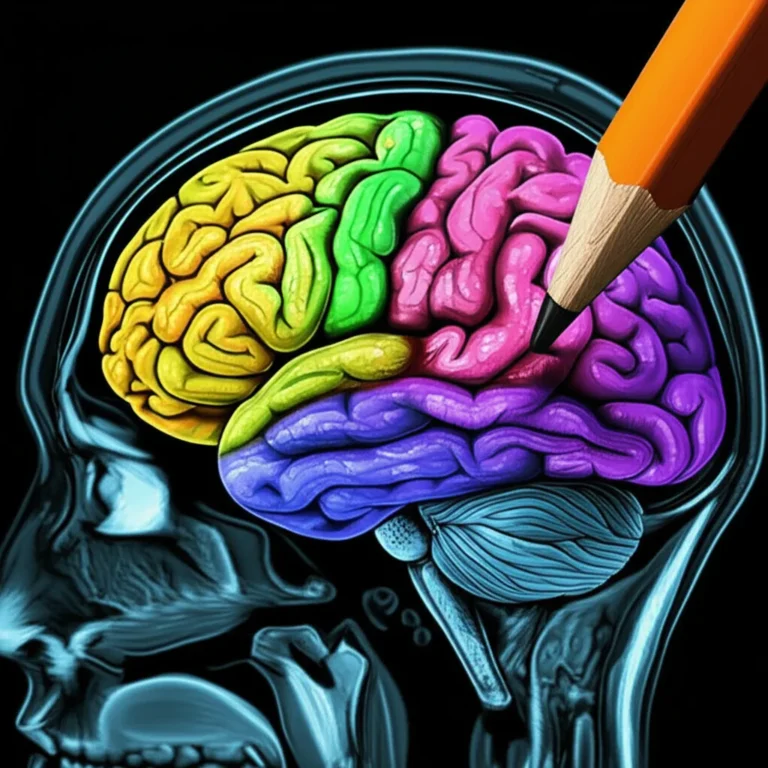Support our educational content for free when you buy through links on our site. Learn more
Is 135 a Good IQ? 10 Things You Need to Know [2024] 🤯

You’ve heard the buzz about IQ scores, and you’re curious about what an IQ of 135 means. Maybe you took a test, maybe you’re just naturally curious. Either way, you’re in the right place! We’re going to dive deep into the world of IQ scores and what it means to have an IQ of 135. Think of it like a treasure map to your potential, but with a few twists and turns along the way. We’ll uncover the history of IQ testing, explore the meaning of different scores, and discuss the limitations of these tests. We’ll even delve into how you can potentially improve your cognitive abilities and what your IQ score might mean for your career and relationships. Ready to unlock the secrets of your intelligence? Let’s get started!
Quick Answer
An IQ of 135 is considered very high, placing you in the top 1% of the population. This means you have exceptional cognitive abilities, potentially making you a fast learner, adept at problem-solving, and skilled in abstract thinking.
However, it’s important to remember that IQ is just one aspect of intelligence. It doesn’t define your potential, and other factors like your personality, motivation, and life experiences play a crucial role in your success.
Ready to learn more? Keep reading!
👉 Shop Brain Training Apps on:
- Lumosity: Amazon | Google Play | Apple App Store | Lumosity Official Website
- Elevate: Amazon | Google Play | Apple App Store | Elevate Official Website
- Peak: Amazon | Google Play | Apple App Store | Peak Official Website
Table of Contents
- Quick Tips and Facts
- The History of IQ Testing and What it Means to You
- Understanding IQ Scores: What Does 135 Really Mean?
- IQ Scores and Your Potential: Are You a Genius?
- The Limitations of IQ Tests: Why Your Score Isn’t Everything
- How to Improve Your IQ: Can You Actually Boost Your Brainpower?
- IQ Scores and Success: Does a High IQ Guarantee Achievement?
- IQ Scores and Career Choices: What Jobs Are Right for You?
- IQ Scores and Relationships: Does Intelligence Matter in Love?
- IQ Scores and Life Satisfaction: Does Intelligence Lead to Happiness?
- Conclusion
- Recommended Links
- FAQ
- Reference Links
Quick Tips and Facts
An IQ of 135 is considered very high. It places you in the top 1% of the population, meaning you have a significantly higher than average cognitive ability. 🤯 But what does that really mean for you?
It’s important to remember that IQ is just one measure of intelligence. It’s a snapshot of your cognitive abilities at a particular point in time, and it doesn’t tell the whole story. Other factors, like your personality, motivation, and life experiences, also play a significant role in your success.
Here are some quick facts about IQ scores:
- Average IQ: 100
- Standard Deviation: 15 (meaning 68% of people score between 85 and 115)
- Top 2%: IQ of 130 or higher
- Mensa Membership: IQ of 132 or higher (though specific requirements vary by test)
Want to learn more about IQ scores and how they relate to your potential? Keep reading!
The History of IQ Testing and What it Means to You

The history of IQ testing is fascinating and complex. It’s a story of innovation, controversy, and evolving understanding of human intelligence.
The Origins of IQ Testing
The concept of IQ testing has its roots in the early 20th century, with the work of Alfred Binet and Theodore Simon. Their goal was to identify children who needed extra support in school, and their test was designed to measure a child’s mental age relative to their chronological age.
The Rise of IQ Testing
IQ testing quickly gained popularity, and it was used for a variety of purposes, including:
- Identifying gifted children
- Placing students in appropriate educational programs
- Screening for military service
- Assessing immigrants
The Controversies of IQ Testing
However, IQ testing also faced significant criticism. Some argued that the tests were culturally biased and did not accurately reflect the intelligence of individuals from different backgrounds. Others raised concerns about the potential for misuse of IQ scores, such as labeling children as “inferior” or using scores to justify discrimination.
The Evolution of IQ Testing
Over time, IQ tests have been revised and improved, and there is now a greater understanding of the complexities of intelligence. Today, IQ tests are used more cautiously and are often combined with other assessments to provide a more comprehensive picture of an individual’s abilities.
Want to know more about how IQ tests are used today? Let’s dive into the meaning of different IQ scores.
Understanding IQ Scores: What Does 135 Really Mean?
An IQ score of 135 is impressive. It means you’re in the top 1% of the population in terms of cognitive ability. But what does that actually mean for you?
The Bell Curve and IQ Scores
IQ scores are typically distributed along a bell curve, with the average score being 100. A standard deviation of 15 means that 68% of people score between 85 and 115.
Here’s a breakdown of IQ score ranges and their corresponding classifications:
| IQ Range | Classification |
|---|---|
| 130 and above | Very Superior |
| 120–129 | Superior |
| 110–119 | High Average |
| 90–109 | Average |
| 80–89 | Low Average |
| 70–79 | Borderline |
| 69 and below | Extremely Low |
What Does an IQ of 135 Mean?
An IQ of 135 falls within the “Very Superior” range, which means you have exceptional cognitive abilities. You’re likely to be:
- A fast learner
- Able to solve complex problems
- Good at abstract thinking
- Able to learn new skills quickly
But remember, an IQ score is just one piece of the puzzle. It doesn’t tell the whole story about your potential.
IQ Scores and Your Potential: Are You a Genius?
An IQ of 135 puts you in the realm of “genius,” but what does that really mean? Is it a guarantee of success?
The Myth of the Genius
The idea of the “genius” is often romanticized, but it’s important to remember that genius is not just about IQ. It’s a complex combination of factors, including:
- Cognitive ability
- Creativity
- Passion
- Motivation
- Opportunity
- Hard work
IQ and Potential
While a high IQ can give you a head start, it’s not a guarantee of success. Many people with high IQs never achieve their full potential, while others with lower IQs go on to achieve great things.
The key is to use your intelligence to your advantage and to develop your other strengths.
Want to know more about the limitations of IQ tests? Let’s explore that next.
The Limitations of IQ Tests: Why Your Score Isn’t Everything
IQ tests can be a useful tool, but they have limitations. It’s important to understand these limitations to avoid drawing inaccurate conclusions about your intelligence or potential.
IQ Tests Measure a Limited Range of Abilities
IQ tests are designed to measure a specific set of cognitive abilities, such as reasoning, problem-solving, and memory. They don’t measure other important aspects of intelligence, such as:
- Creativity
- Emotional intelligence
- Social skills
- Practical intelligence
IQ Tests Can Be Culturally Biased
IQ tests are often developed and standardized within a particular cultural context. This can lead to bias against individuals from different cultures who may not be familiar with the test’s language, concepts, or cultural references.
IQ Scores Can Fluctuate
IQ scores can vary depending on factors such as stress, fatigue, and motivation. It’s also important to note that IQ scores can change over time, especially during childhood and adolescence.
IQ Scores Don’t Tell the Whole Story
IQ tests are just one piece of the puzzle when it comes to understanding intelligence. Other factors, such as your personality, motivation, and life experiences, also play a significant role in your success.
Ready to learn how you can potentially improve your IQ? Let’s dive into that next.
How to Improve Your IQ: Can You Actually Boost Your Brainpower?
While your IQ is generally considered stable throughout life, there are things you can do to improve your cognitive abilities and potentially boost your IQ score.
Brain Training and Cognitive Enhancement
There are a variety of brain training programs and cognitive enhancement techniques that can help you improve your memory, attention, and problem-solving skills. These programs often involve exercises that challenge your brain in new ways, such as:
- Puzzles
- Memory games
- Brain teasers
- Logic problems
Some popular brain training apps include:
- Lumosity
- Elevate
- Peak
Lifestyle Changes for Brain Health
In addition to brain training, there are a number of lifestyle changes you can make to support your brain health and cognitive function:
- Get enough sleep: Aim for 7-8 hours of sleep per night.
- Eat a healthy diet: Include plenty of fruits, vegetables, and whole grains.
- Exercise regularly: Physical activity is good for both your body and your brain.
- Manage stress: Chronic stress can have a negative impact on cognitive function.
- Challenge yourself: Engage in activities that stimulate your brain, such as learning a new language or playing a musical instrument.
The Importance of Learning and Growth
Ultimately, the best way to improve your IQ is to continuously learn and grow. Read books, take classes, engage in stimulating conversations, and challenge yourself to learn new things.
Curious about how IQ scores relate to success? Let’s explore that next.
IQ Scores and Success: Does a High IQ Guarantee Achievement?
While a high IQ can be an advantage, it doesn’t guarantee success in life. Many other factors contribute to achievement, including:
Hard Work and Determination
Success often requires hard work, dedication, and perseverance. Even with a high IQ, you need to be willing to put in the effort to achieve your goals.
Motivation and Passion
Motivation and passion are essential for driving you to pursue your goals and overcome obstacles. A high IQ alone won’t provide the drive and inspiration to succeed.
Opportunity and Luck
Opportunity and luck also play a role in success. Even with a high IQ and a strong work ethic, you may not succeed if you don’t have the right opportunities or if you’re not in the right place at the right time.
Other Factors
Other factors that contribute to success include:
- Social skills
- Emotional intelligence
- Resilience
- Creativity
- Networking
Let’s see how IQ scores can influence career choices.
IQ Scores and Career Choices: What Jobs Are Right for You?
A high IQ can open doors to a wide range of careers that require advanced cognitive abilities. However, it’s important to consider your interests, skills, and values when making career choices.
Careers That Often Require High IQs
Some careers that often require high IQs include:
- Scientists
- Engineers
- Doctors
- Lawyers
- Professors
- Software developers
- Financial analysts
Other Important Considerations
While a high IQ can be an asset in these fields, it’s important to remember that other factors are also crucial for success, such as:
- Passion
- Hard work
- Communication skills
- Problem-solving abilities
- Teamwork skills
Wondering about the role of IQ in relationships? Let’s explore that next.
IQ Scores and Relationships: Does Intelligence Matter in Love?
While intelligence can be a factor in attraction and compatibility, it’s not the only thing that matters in a relationship. Other factors, such as:
- Shared values
- Mutual respect
- Communication skills
- Emotional intelligence
- Physical attraction
The Importance of Shared Values and Interests
Having shared values and interests can make a relationship more fulfilling and enjoyable. However, it’s important to remember that differences can also be enriching and can lead to growth and learning.
The Role of Communication and Emotional Intelligence
Strong communication skills and emotional intelligence are essential for building and maintaining healthy relationships. These skills allow you to understand and empathize with your partner, resolve conflicts constructively, and nurture a strong emotional connection.
Let’s wrap up with a look at the connection between IQ and life satisfaction.
IQ Scores and Life Satisfaction: Does Intelligence Lead to Happiness?
While intelligence can contribute to life satisfaction, it’s not the only factor that determines happiness. Other factors, such as:
- Strong relationships
- Meaningful work
- Good health
- Financial security
- A sense of purpose
The Importance of Meaning and Purpose
Finding meaning and purpose in life is essential for happiness and well-being. This can come from a variety of sources, such as:
- Your work
- Your relationships
- Your hobbies
- Your community
Ready to learn more about IQ scores and what they mean for you? Let’s move on to the conclusion.
Conclusion

An IQ of 135 is a remarkable achievement, placing you in the top 1% of the population. It signifies exceptional cognitive abilities, potentially making you a fast learner, adept at problem-solving, and skilled in abstract thinking. However, remember that IQ is just one aspect of intelligence. It doesn’t define your potential, and other factors like your personality, motivation, and life experiences play a crucial role in your success.
Don’t let your IQ score define you. Instead, use it as a starting point to explore your strengths, pursue your passions, and strive for continuous learning and growth. Embrace the opportunities that come with your high cognitive ability, but remember that hard work, determination, and a positive mindset are equally important for achieving your goals.
Recommended Links
👉 Shop Brain Training Apps on:
- Lumosity: Amazon | Google Play | Apple App Store | Lumosity Official Website
- Elevate: Amazon | Google Play | Apple App Store | Elevate Official Website
- Peak: Amazon | Google Play | Apple App Store | Peak Official Website
Books on Intelligence and Success:
- “Intelligence: Know Your IQ” by Richard Griggs Amazon
- “The 7 Habits of Highly Effective People” by Stephen R. Covey Amazon
- “Mindset: The New Psychology of Success” by Carol S. Dweck Amazon
FAQ

How common is an IQ of 135?
An IQ of 135 is considered very high, placing you in the top 1% of the population. This means that only about 1 out of every 100 people has an IQ of 135 or higher.
Read more about “IQ 135 Percentile: Unlocking the Secrets of the Top 1% … ✅”
Is 135 IQ enough for Mensa?
While an IQ of 135 is significantly above average, it may not be enough for Mensa membership. Mensa requires a score at or above the 98th percentile on a standardized IQ test, which typically translates to an IQ of 132 or higher. However, specific requirements can vary depending on the test used.
Read more about “Is 135 IQ a Genius? … 🧠”
What is Elon Musk’s IQ?
Elon Musk’s IQ has never been officially confirmed. While some sources claim he has an IQ of 155, there is no reliable evidence to support this claim. It’s important to remember that IQ scores are not always accurate, and they don’t tell the whole story about a person’s intelligence or potential.
Read more about “What is Elon Musk’s IQ?”
What is Albert Einstein’s IQ?
Albert Einstein’s IQ was never officially tested, but some estimates place it around 160. However, these estimates are based on speculation and are not scientifically validated. It’s important to note that Einstein’s genius was not solely defined by his IQ but by his creativity, curiosity, and dedication to scientific discovery.
Read more about “What is Albert Einstein’s IQ?”
Does a high IQ guarantee success in life?
No, a high IQ does not guarantee success in life. Many other factors contribute to achievement, including hard work, determination, motivation, opportunity, and luck. While a high IQ can be an advantage, it’s not a guarantee of success.
Read more about “121 IQ & Mensa: What You Need to Know 🧠 …”
What can I do to improve my IQ?
While your IQ is generally considered stable throughout life, there are things you can do to improve your cognitive abilities and potentially boost your IQ score. These include engaging in brain training programs, making lifestyle changes to support brain health, and continuously learning and growing.
Read more about “Is 121 a Good IQ for a 12-Year-Old? 7 Things Every Parent Should Know … 🤔”
Reference Links
- Lumosity: Lumosity Official Website
- Elevate: Elevate Official Website
- Peak: Peak Official Website
- Mensa International: Mensa International Website
- IQ Classification – Wikipedia: IQ Classification – Wikipedia






